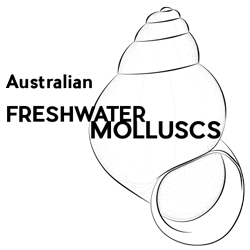
This species belongs to the Austropyrgus sparsus group, whose members are characterised by the following shell features: small to medium-sized shells, conical, with convex to slightly convex whorls. In females, the coiled oviduct is of an inverted U-shape or with two or more bends, loops or twists.
Austropyrgus diemensis differs from the other species of this group in the following combination of characters: shell medium in size, broad, squat, with straight spire outline and convex whorls; pallial vas deferens strongly undulating at base of unpigmented penis; seminal receptacle at anterior edge to middle of inner wall of bursa copulatrix.
Austropyrgus diemensis (Frauenfeld, 1863)
Class Gastropoda
Infraclass Caenogastropoda
Order Littorinida
Suborder Rissoidina
Superfamily Truncatelloidea
Family Tateidae
Genus Austropyrgus Cotton, 1942
Original name: Amnicola diemense Frauenfeld, 1863. In Frauenfeld, G. R. (1863). Vorläufige aufzählung der arten der gattungen Hydrobia Htm. und Amnicola Gld. Hldm. in der kaiserlichen und Cuming’s Sammlung. Verhandlungen de Zoologisch-Botanischen Gesellschaft, Wien 13: 1017–1032.
Type locality: Tasmania—restricted to Cataract Gorge, South Esk River, Launceston, Tasmania by Clark et al. (2003).
Synonyms: Potamopyrgus woodsii Petterd, 1889; Potamopyrgus brownii Petterd, 1889.
In streams on water weeds, hard substrata (rocks etc.) and crawling on litter and sediment. Can be locally abundant. Assumed to feed by scraping bacteria and microalgae. Lay solitary capsules containing a single egg. Direct development.
This is a very widespread species found mainly in the drainage of the South Esk River, north-eastern Tasmania.
Although most species of Austropyrgus are geographically isolated and have restricted ranges, a few - such as A. diemenensis - have wider ranges.
Clark, S. A., Miller, A. C. & Ponder, W. F. (2003). Revision of the snail genus Austropyrgus (Gastropoda: Hydrobiidae): a morphostatic radiation of freshwater gastropods in southeastern Australia. Records of the Australian Museum 28: 1–109.